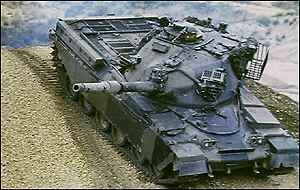The Electronic Intifada 11 April 2002

Over £12 million worth of defence equipment was licensed for sale by Britain to Israel last year, including components for combat helicopters, combat aircraft and parts vital for electronic warfare. Yet, incongruously, the Foreign and Commonwealth Office states that it “will not issue export licences where there is a clearly identifiable risk that the equipment might be used for internal repression or adversely affect regional stability”.
Britain says it has an Israeli assurance that no British equipment is used for internal repression of Palestinians. But an investigation by BBC’s World at One programme, broadcast in August 2001, raised serious doubts about that assurance. It showed that the supposed guarantees offered to Britain are ineffective, and have already been breached. Ben Bradshaw, the British Foreign Office minister, said that Britain accepted Israeli assurances that exports were not being used against the Palestinians and that military sales to Israel were “minuscule”, adding: “Basically, America arms Israel.”
However, last week, Ben Bradshaw, disclosed that evidence showed that Israel had modified a number of Centurion tanks exported between 1958 and 1970 into armoured personnel carriers. “This contradicts a written assurance that the Israeli government gave us on Nov. 29, 2000, that `no UK-originated equipment nor any UK-originated systems, sub-systems (or) components are used as part of the Israel army’s activities in the territories’.”
Britain is not the only EU member state that trades arms with Israel. Germany, France and the Netherlands are also major arms traders. The situation in Israel and the occupied Palestinian territories should be foremost on the minds of European officials when they carry out their reviews of the EU Code of Conduct for Arms Exports. The code was adopted in 1998 with the aim of “setting high common standards” over arms exports.
Criteria include respect of human rights in the country of final destination; in particular, member states will “not issue an export licence if there is a clear risk that the proposed export might be used for internal repression”, including, inter alia, torture and other cruel, inhuman and degrading treatment or punishment, summary or arbitrary executions, arbitrary detentions and other major violations of human rights and fundamental freedoms as set out in relevant international human rights instruments.
Human rights organisations and various bodies of the United Nations have documented such major violations of human rights and fundamental freedoms in the case of Israel. For example, Israel has a declared and official policy of extra-judicial executions, which has been formally condemned by the European Union as a violation of international law.
Other criteria include the existence of tensions or armed conflicts, and whether there is a clear risk that the intended recipient would use the proposed export aggressively against another country or to assert by force a territorial claim. Political and military experts can provide the necessary assessment that, indeed, Israel would fail the test on this item. Moreover, an assessment includes “the behaviour of the buyer country with regard to the international community”, in particular with regard to respect for international law, “its compliance with its international commitments, in particular the non-use of force, including under international humanitarian law applicable to international and non-international conflicts”.
It must be clear that Israel’s record is inconsistent with the criteria provided in the EU Code of Conduct. Export licences should therefore be refused. Last year, European Union member states imposed arms embargoes on Zimbabwe over what they perceived as the government’s deteriorating human rights record.
Taking into account the volume and gravity of human rights violations and breaches of the Fourth Geneva Convention, including acts of war crimes, that have been documented by various human rights organisations and United Nations bodies, and the volume of Israeli forces and military equipment stationed in the occupied Palestinian territories, and since there is no common system of monitoring the end-use of European arms by the Israeli forces in the Palestinian territories, only a full arms embargo will prevent European arms from being used to commit war crimes and other human rights abuses. The European Union, therefore, should renew its arms embargo against Israel, which it lifted in 1994.
The author is one of the founders of The Electronic Intifada. The article was first published in The Jordan Times.



